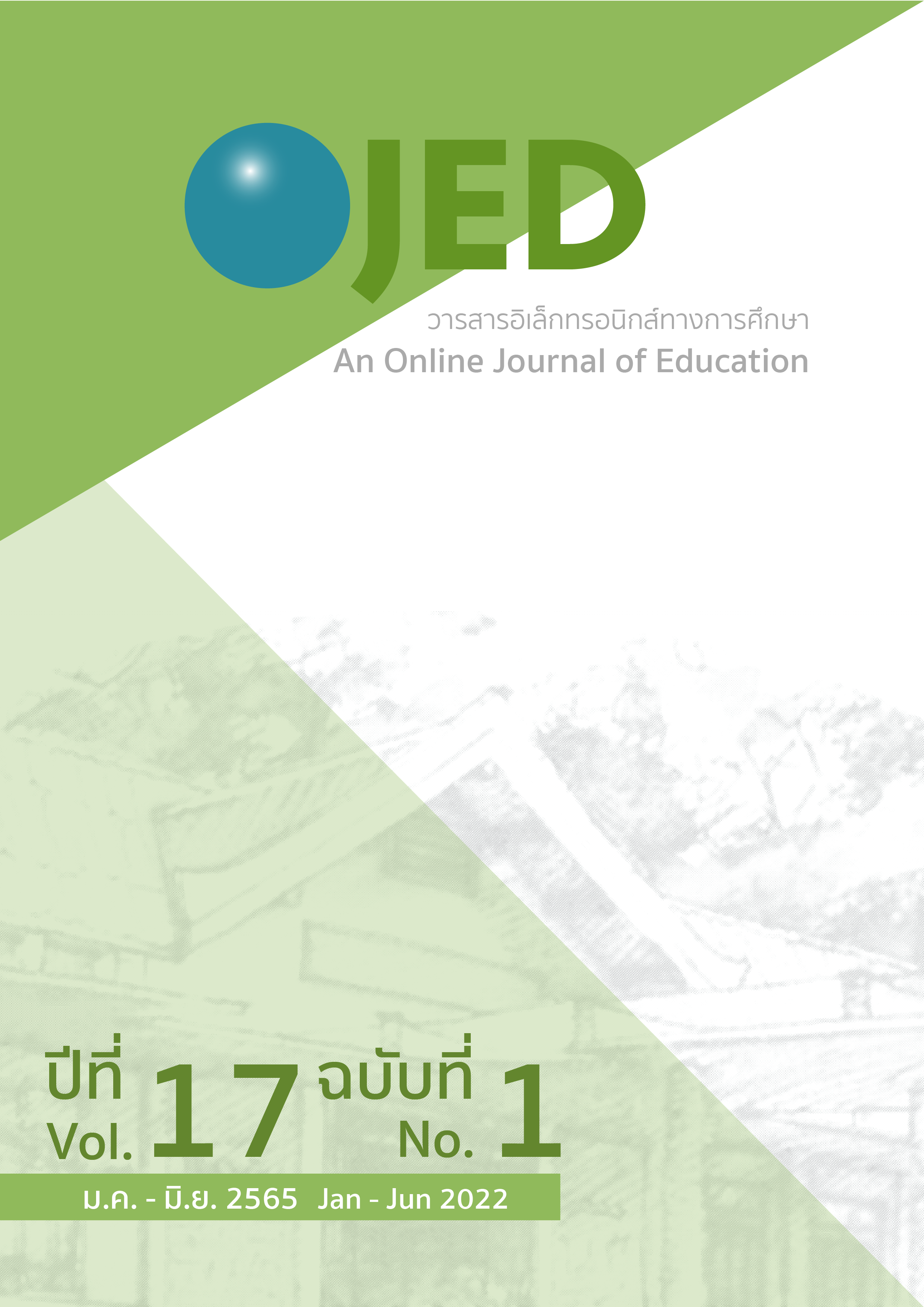Effects of Organizing Guided Play Activities and Outdoor Loose Parts Towards Collaborative Play Behaviors of Kindergarteners
DOI:
https://doi.org/10.14456/ojed.2022.35Keywords:
guided play, outdoor loose parts, collaborative play, kindergartenersAbstract
The objectives of this research were: 1) Study the effect of organizing guided play activities with outdoor loose parts towards collaborative play behaviours of kindergarteners in three components, namely sharing, negotiating and following rules; 2) Compare the effect of organizing guided play activities with outdoor loose parts and outdoor activities, according to the early childhood curriculum, towards collaborative play behaviours of kindergarteners. The sample consisted of forty-eight kindergarteners studying in Kindergarten Class 3, second semester of academic year 2021 at Watsawangarom School under the Phra Nakhon Si Ayutthaya Primary Educational Service Area Office 1. The samples were equally divided into Experimental and Control groups by drawing lots. The duration of the research was ten weeks. The research instrument was the collaborative play behaviour assessment form. Data was analysed by employing the arithmetic mean, standard deviation and math paired t-test. The research results found that: 1) After the study, the Experimental group gained a higher mean score of collaborative behaviours in all three components than before, at a .05 statistically significant level; 2) After the study, the Experimental group had a higher mean score of collaboratives than those of the Control group, at a .05 statistically significant level.
References
กรมอนามัย. (2561). การศึกษาปัจจัยที่มีผลต่อพัฒนาการเด็กปฐมวัยไทย ครั้งที่ 6 พ.ศ. 2560. บริษัท ซีจีทูล.
กองกิจกรรมทางกายพื่อสุขภาพ กรมอนามัย กระทรวงสาธารณสุข. (2561). คู่มือข้อแนะนำกิจกรรมทางกายและการจัดสภาพแวดล้อมที่เอื้อต่อการมีกิจกรรมทางกายของเด็กสำหรับสถานพัฒนาเด็กปฐมวัย. เอ็นซี คอนเซ็ปต์.
วรรณี แกมเกตุ. (2551). วิธีวิทยาการวิจัยทางพฤติกรรมศาสตร์. จุฬาลงกรณ์มหาวิทยาลัย.
วีรพงศ์ บุญประจักษ์. (2545). การจัดประสบการณ์การเล่นพื้นบ้านไทยที่มีผลต่อพฤติกรรมทางสังคมของเด็กปฐมวัย. [ปริญญานิพนธ์การศึกษามหาบัณฑิต]. มหาวิทยาลัยศรีนครินทรวิโรฒ.
สมาคมอนุบาลศึกษาแห่งประเทศไทยในพระราชูปถัมภ์. (2560). การสร้างวินัยสำหรับเด็ก. พลัสเพรส.
อรุณี หรดาล. (2563). สอนอย่างไรให้เด็กปฐมวัยคิดเป็น. วารสารวไลอลงกรณ์ปริทัศน์ (มนุษยศาสตร์และสังคมศาสตร์), 10(2), 211-228.
Casper, V., & Theilheimer, R. (2010). Early childhood education. McGraw-Hill.
Casey, T., & Robertson, J. (2019). Loose parts play: A toolkit (2nd ed.). Inspiring Scotland.
Charlesworth, R., & Lind, K. (2010). Math and science for young children. Thomson Delmar Learning.
Flannigan, C., & Dietze, B. (2017). Ideas from practice: Children, outdoor play, and loose parts. Journal of Childhood Study, 42(4), 53-60.
Jin, M., & Moran, M. J. (2021). Chinese and US preschool teachers’ beliefs about children’s cooperative problem-solving during play. Journal of Early Childhood Education, 49, 503-513.
Kennedy, A. (2009). Let’s talk! have meaningful conversations with children. Putting Children First, (32), 11-13.
McClintic, S. (2014). Loose parts: Adding quality to the outdoor environment. Texas Child Care quarterly, 38(3), 16-20.
Nicholson, S. (1971). How not to cheat children: The theory of loose parts. Landscape Architecture, 62, 30–34.
Paley, V. G. (1990). The boy who would be a helicopter. Harvard University Press.
Robson, S., & Rowe, V. C. (2012). Observing young children's creative thinking: Engagement, involvement and persistence. Journal of Early Years Education, 20(4), 349-364.
Scott, H. K., & Cogburn, M. (2020). Peer play. StatPearls.
Shim, S., Herwig, J. E., & Shelley, M. (2001). Preschoolers' play behaviors with peers in classroom and playground settings. Journal of Research in Childhood Education, 15(2), 149-163.
Svetlova, M., Nichols, S. R., & Brownell, C. A. (2010).Toddlers’ prosocial behavior: From instrumental to empathic to altruistic helping. Child Development, 81, 1814–1827.
University of Gothenburg. (2010, June 24). Young children are skilled negotiators, Swedish research finds. ScienceDaily. www.sciencedaily.com/releases/2010/06/100621101206.htm
Weisberg, D. S., Hirsh-Pasek, K., & Golinkoff, R. M. (2013). Guided play: Where curricular goals meet a playful pedagogy. Mind, Brain and Education, 7(2), 104-112.
Weisberg, D. S., Hirsh-Pasek, K., Golinkoff, R. M., Kittredge, A. K., & Kittredge, D. (2016). Guided play: Principles and practices. Current Directions in Psychological Science, 25(3), 177- 182.
Downloads
Published
How to Cite
Issue
Section
License
Copyright (c) 2022 An Online Journal of Education

This work is licensed under a Creative Commons Attribution-NonCommercial-NoDerivatives 4.0 International License.




